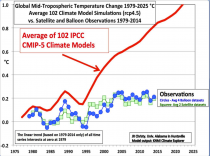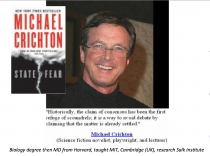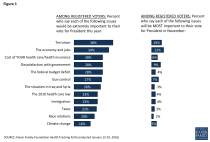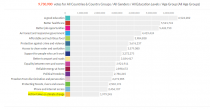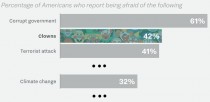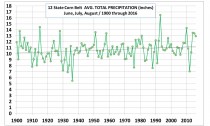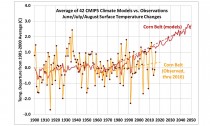See Willis Eschenbach’s excellent post on The DOE vs. Ugly Reality oN WUWT here.
He starts:
Over at the Washington Post, Chris Mooney and the usual suspects are seriously alarmed by a memo sent out by the Transition Team at the Department of Energy. They describe it in breathless terms in an article entitled “Trump transition team for Energy Department seeks names of employees involved in climate meetings“. The finest part was this quote from Michael Halpern:
Michael Halpern, deputy director of the Union of Concerned Scientists’ Center for Science and Democracy, called the memo’s demand that Energy officials identify specific employees “alarming.”
“If the Trump administration is already singling out scientists for doing their jobs, the scientific community is right to be worried about what his administration will do in office. What’s next? Trump administration officials holding up lists of ‘known climatologists’ and urging the public to go after them?”
Halpern asked.
Oh ... you mean like say the Attorneys General of a bunch of states holding up their lists of known “:denier” organizations and tacitly urging the public to go after them? You mean like government officials of a variety of stripes ranting about how “deniers” should be brought to trial or otherwise penalized? You mean like having sites like DeSmogBlog making ugly insinuations and false statements about every known opponent of the climate party line? You mean like Roger Pielke being hounded out of his job by the climate mob?
Mr. Halpern, we have put up with just that treatment you describe for years now. Let me suggest that you take your inchoate fears and do something useful with them - you can think fearfully about how you have treated your scientific opponents for the last decade, and you can hope and pray that they are like me, and they don’t demand the exact same pound of flesh from you.
-------
Bureaucratic overreach at EPA has been out of control for eight years.
Now there’s a new sheriff coming to town.
Donald Trump has nominated Oklahoma Attorney General Scott Pruitt for the tough job of reigning in EPA as its new administrator and shifting its focus away from Green dogma back to its core mission of ensuring a clean, safe environment.
As Coral Davenport of the NYT reported:
As Oklahoma’s top law enforcement official, Mr. Pruitt has fought environmental regulations - particularly the climate change rules. Although Mr. Obama’s rules were not completed until 2015, Mr. Pruitt was one of a handful of attorneys general, along with Greg Abbott of Texas, who began planning as early as 2014 for a coordinated legal effort to fight them. That resulted in a 28-state lawsuit against the administration’s rules. A decision on the case is pending in a federal court, but it is widely expected to advance to the Supreme Court.
Predictably, Green campaigners are having a hissy fit.
Pruitt at the helm “is going to be a disaster,” said Earthjustice vice president Lisa Garcia.
“The selection of Attorney General Pruitt, who has consistently questioned climate science and actively fought EPA’s ability to reduce emissions, raises deeply troubling questions,” fretted Sam Adams of the World Resources Institute.
Obama advisor Dan Pfeiffer even went so far as to tweet that Pruitt represents “an existential threat to the planet.”
Of course, he’s no such thing.
Scott Pruitt’s principled stands as Oklahoma’s Attorney General against such follies as Obama’s misnamed “Clean Power Plan” and his reasoned skepticism of climate alarmism indicate he knows the difference between radical Green ideology and genuine environmentalism.
Marc Morano explanation at CFACT’s Climate Depot made the Drudge Report:
“President-Elect Trump’s appointment of Scott Pruitt is a breath of fresh air. No longer do we have to suffer under President Obama’s ridiculous EPA ‘climate’ regulations. It is also refreshing that a Republican President is not throwing the EPA over to the green activists and the media by appointing a weak administrator.”
“Trump’s pick of Pruitt finally means that a Republican President is standing up the green establishment! Historically, EPA chiefs have been among the most pro-regulatory members of past Republican presidents from Nixon through Ford, Reagan and both Bushes. Trump has broken the cycle!”
Keeping the environment clean is vital. Economy-wrecking regulations and wealth redistribution are counter-productive to that goal.
The sheer panic and harsh criticism emanating from the Left, to paraphrase Ronald Reagan, only validates he must be “saying and doing all the right things.”
-----------
See the industry view on the prospects of regaining control of our energy here.
ICECAP NOTE:
We could not agree more. I worked on my doctorate at NYU with an Air resources Doctoral Traineeship grant. We were all environmentalists in the original sense of the word. We had serious pollution of air and water issues. We knew if we would ever get to the point where combustion no longer emitted particulates in large numbers, nitrous oxides, carbon monoxide, hydrocarbons, and other effluents and only emitted what we all knew were the harmless gases like water vapor and carbon dioxide, we would have cleaned up out air. See former EPA chief Economist and Science Analyst Alan Carlin’s take on CO2 here. Also controlling the dumping of harmful chemical into our water systems would bring them back to life (example Lake Erie once called dead is back). But the EPA staring with a good purpose went astray starting in the Nixon administration and culminating in extreme overreaching regulatory levels under Obama. We have been well under EPS imposed standards for particulates and ozone for years. Pushing extreme unnecessary regulations strangle all industry ($1 trillion) and the cost trickles down to all of us. We look forward to the EPA and Trump eliminating the overreaching regulations. We can have a clean environment and low energy costs that lowers the costs of all goods and services and puts more money in our pockets to spend on the things we need for our families.
Ironically the same environmental fanatics pushing extreme regulatory control of our energy and transportation industries, fight any attempts to build power plants in the third world where many live in the dark without refrigeration and forced to cook over wood or even dung fired fires, condemned to die early from respiratory and other diseases because as SOS Joh Kerry told them, to give them power would just increase the AGW problem. Left unsaid was the other concern of the ECO fringe that we already have an overpopulation problem and giving the poor energy (as we see in India and China now) will just exacerbate it.
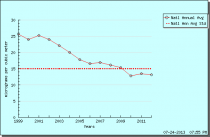
Enlarged See how the small particulate concentrations nationally have been cut in half and are well well national standards.
See their real motivation here.
See what Dr. Patrick Moore, a co-founder of Greenpeace says about why he left the radicalized movement.
President-elect Donald Trump’s Environmental Protection Agency transition leader, Myron Ebell, is a huge threat to the green gravy train. Now, with billions of crony dollars at stake, the green slander machine is doing all it can to slime him.

Following their standard tactic, advocates of big government cronyism have picked someone to demonize as the face of small-government, pro-freedom ideals.
Ebell is that face, and he’s enduring the left’s vilification for voicing reasonable thought on climate change policy. Though he bears the burden with grace and humor, there is no excuse for the personal attacks, which are designed to distract attention from the high stakes of the debate.
What’s at stake for big green is billions upon billions of dollars taken from taxpayers and consumers and given to green crony businesses. Just for wind energy alone, grants, tax credits, loan guarantees, and other subsidies add up to at least $176 billion.
What isn’t at stake - contrary to the left’s talking points - s the Earth’s climate.
As costly as our current energy and climate policies are to the economy (they would cost the U.S. a net loss t of 400,000 jobs and up to $2.5 trillion), they are projected to have negligible impacts on global temperatures (EPA’s own admission) - even if you believe the questionable climate models of the Intergovernmental Panel on Climate Change (IPCC).
Recall ICECAP participated to a detailed analysis of the so-called science behind EPA’s regulatory assault and found if we consider the natural multidecadal clustering of ENSO events, there has been no statistically significant warming in any of the 13 satellite, balloon and surface data sets in the tropical high atmosphere (where the climate models say the warming is most concentrated due to claimed CO2 trapping and water vapor latent heat release) and globally in the so called global warming era. Any land surface warming can be attributed to urbanization and land use changes.
When judged by their actual effect, it becomes clear that the real goal of international climate policies is a power and money grab that no one, not even its most vocal supporters, believes will have much impact on the climate.
In fact, Christiana Figueres - until recently the executive secretary of the U.N. Framework Convention on Climate Change - noted that the goal of those policies was to rearrange the world economy:
This is the first time in the history of mankind that we are setting ourselves the task of intentionally, within a defined period of time, to change the economic development model that has been reigning for at least 150 years, since the Industrial Revolution.
The big problem for the framework convention, the IPCC, renewable energy hustlers, and climate rent-seekers of all sorts is that Ebell is on to their game. So, out come the daggers of personal attacks and character assassination.
Many in the media are more than happy to abet the groups who perpetrate these attacks. The Media Research Center provides a nice sampler of these attacks and associated yellow journalism here.
It’s not at all clear what the name-callers mean when they call Ebell a “climate denier,” but in a bizarre semantic twist, they appear to mean that he is not a hysterical climate data denier.
Like most skeptics, Ebell recognizes the basic carbon dioxide science: Adding carbon dioxide to the atmosphere may somewhat increase warming. But he also recognizes the much more important question: How much is this “somewhat”?
Ebell and those following the numbers know that the Earth’s warming to date is much less than the IPCC models predicted and that the actual data don’t point to a climate catastrophe.
In addition, the unhinged claims of ever-worsening, extreme climate events don’t square with the data either. There are no upward trends in droughts, floods, tornadoes, or hurricanes.
Because knowledge of these facts is such a threat to the climate-industrial complex, anyone who dares to expose the truth comes under threat of personal destruction.
In 1987, “Borking” became a term for getting shot down after the U.S. Senate torpedoed Robert Bork’s nomination to the Supreme Court. We should not allow green activists to make “Ebelling” a synonym for “Borking.”
Your donation will support The Daily Signal’s investigative journalism, groundbreaking reporting, and conservative policy analysis on today’s most critical issues. Donate to support us today.
By Joseph D’Aleo, CCM, Fellow
Until the last strong El Nino brought the normal spike in global temperatures, there was much ado about what was being called a pause of almost 19 years in global temperature rise. Eventually even the once professional societies like the AMS, had to admit to it and had papers published and many panels at annual meetings discussing why the accelerated warming predicted by climate models and the UN IPCC was not occurring even as global CO2 levels continued to rise.
The first efforts made were to modify the data sets (surface and some balloon and satellite) to bring the data closer into agreement with the models (instead of rethinking the theory and models). Then the got the help from El Nino. A weak La Nina and a declining sun should cause temperatures to fall off and the pause resume but the train may have left the station after the Paris Treaty.
This conflicting data had for several years brought an uncomfortable feeling among many believers, what is called ‘cognitive dissonance’, but most all were able to shake it off especially when they have so many colleagues riding the same grant gravy trains that benefit from the failing theory or have business financial potential and/or personal political ideologies that the plans to address the so-called Catastrophic Anthropogenic Global Warming fits so nicely into.
A fine work over five decades ago by Leon Festinger, a social psychologist helps explain how they can do that and why we may not see a widespread rapid return to sanity on global climate change even as the pause resumes and other evidence mounts the prevailing greenhouse theories are flawed, global warming has ceased and climate change may be largely due to natural variability.
When discomfirmatory (contrary) evidence is presented, Festinger found one condition that often determined whether the belief is discarded or maintained with new fervor by belief with a strongly held belief. That was whether or not the individual believer has social support. It is unlikely that one isolated believer could withstand strong discomfirming evidence. If, however, the believer is a member of a group of convinced persons who can support one another, you might expect the belief to be maintained and the believers to attempt to proselytize or persuade non-members that the belief is correct even in the face of data suggesting otherwise.
Today there is a huge ‘social support’ group of grant toting modelers and researchers, agenda driven or ratings driven journalists, environmentalists and corporations that have realized green is their favorite color and and see this as a way to keep green paper flowing into their coffers and pockets, farmers who are benefiting from the misplaced focus on alternative fuel from crops which has sent the cost for their crops to record levels, traders and major market firms licking their chops at the prospects of big time money from carbon trading, big oil and alternative energy companies that have realized this is the vector to bigger profits and the politicians and political activists who see it as a way to accomplish ulterior goals about changing society and increasing their powerbase.
In reality although there is claimed consensus, scientists and the public are not so convinced. It will only be after the public realizes they have been snookered or like in the UK, they realize the pains for adhering to the green assault on humanity is insufferable (Brexit was largely due to this) that the situation may turn on them. We can only hope damage done here is not great or irreparable when that day finally comes. That is why you must consider your vote seriously next month.
Perhaps, the greens and the administration and untrustworthy mainstream media with the outrageous claims saying ‘global warming is the greatest peril that humanity faces” has them sensing a snake oil salesman situation.
The late great Michael Crichton, author of State of Fear on this topic, said “Historically, the claim of consensus is the first refuge of scoundrels; it is a way to avoid debate by claiming the matter is already settled.” “Whenever you hear the consensus of scientists agrees on something or other, reach for your wallet, because you’re being had.”
“Let’s be clear: the work of science has nothing whatever to do with consensus. Consensus is the business of politics. In science, consensus is irrelevant. What is relevant is reproducible results. The greatest scientists in history are great precisely because they broke with the consensus.” (Galileo, Newton, Einstein, etc)
He concluded: “There is no such thing as consensus science. If it’s consensus, it isn’t science. If it’s science, it isn’t consensus. Period.”
We all miss the man and his work. Read more on ‘cognitive dissonance’ and Festinger’s work “When Prophecies Fail” here.
HELP IF YOU CAN
I know so many of you are trying to contribute to political candidate races now (very important), but if you can help ICECAP cover its expenses, we would greatly appreciate it. We have no advertising and unlike many of the warmist sites don’t have money from big financiers. Many of the pieces published including the research paper covered in several spots on this home page and over the years numerous AMICI briefs (sample) to the courts trying to curb the regulatory assault on our energy and businesses, large and small have all been done pro-bono. I and my colleagues have all written pro-bono pieces in newspapers and on-line and participated in radio interviews and even hour long local cable TV shows to try and bring reality about the science and awareness of the dangers from the proposed remedies (Climate Action Plan and the EPA regulations) to the public. We get abuse for doing so and claims we are tied to big oil when their heroes are the recipients of the $1.5 trillion that has fed this monster.
The donate button is secure or if you prefer write me at frostdoc@aol.com and I can give you an address you can mail a check to. Small amounts are welcome. Thank you for helping over the last 8 years - 76 million page hits to date and counting. God bless you.
-----------
The public is not buying what the world ‘leaders’ proclaim - US and UN polls. In fact they fear clowns more the global warming.
One of the claims made is that CO2 increases are now or will soon cause crop yields to decline. Roy Spencer replies:
Global Warming be Damned: Record Corn, Soybeans, Wheat
Dr. Roy Spencer
For many years we have been warned that climate change is creating a “climate crisis”, with heat and drought reducing agricultural yields to the point that humanity will suffer. Every time there’s a drought, we are told that this is just one more example of human-caused climate change.
But droughts have always occurred. The question is: Are they getting worse? And, has modest warming had any effects on grain yields?
We have yet to experience anything like the Dust Bowl drought of the 1930s, or the mega-droughts the western U.S. tree ring record suggests occurred in centuries past.
And even if they do occur, how do we know they were not caused by the same natural factors that cause those previous droughts? While “global warming” must cause more precipitation overall (because there is more evaporation), whether this means increased drought conditions anywhere is pretty difficult to predict because it would require predicting an average change in weather patterns, which climate models so far have essentially no skill at.
So, here we are with yet another year (2016) experiencing either record or near-record yields in corn, soybeans, and wheat. Even La Nina, which was widely feared would cause reduced crop yields this year, did not materialize.
How can this be?
How has Climate Changed in the U.S. Corn Belt?
Let’s start with precipitation for the main growing months of June-July-August over the 12-state Corn Belt (IL, IN, IA, KS, NE, ND, SD, MO, WI, MN, MI, OH). All data come from official NOAA sources. Since 1900, if anything, there has been a slight long-term increase in growing season precipitation:
In fact, the last three years (2014-16) has seen the highest 3-yr average precip amount in the entire record.
If we examine temperature, there has been some warming in recent decades, but nothing like that predicted for the same region from the CMIP5 climate models:
That plot alone should tell you that something is wrong with the climate models. It’s not even obvious a statistically significant warming has occurred, let alone attribute it to a cause, given all of the adjustments (or lack of proper adjustments) that have been made to the surface thermometer data over the years. Note the models also cannot explain the Dust Bowl warmth of the 1930s, because the models do not mimic the natural changes in Pacific Ocean circulation which are believed to be the cause.
So, has Climate Change Not Influenced Grain Yields?
Let’s assume the temperature and precipitation observations accurately reveal what has really happened. Has climate change since 1960 impacted corn yields in the U.S.?
As part of some consulting I do for a company that monitors grain markets and growing conditions around the world, last year I quantified how year-to-year variations in U.S. corn yields depend on year-to-year changes in precipitation and temperature, over the period 1960 through 2014. I then applied that relationship to the long-term trends in precipitation and temperature.
What I found was that there might be a small long-term decrease in yields due to climate change, but it is far exceeded by technological advancements that increase yields.
In fact, based upon studies of the dependence of corn yield on CO2 fertilization, the negative climate impact is even outweighed by the CO2 fertilization effect alone. (More CO2 is well known to fertilize, as well as increase drought tolerance and make plants more efficient in their water use).
The people I know in the grain trading business do not even factor in climate change...primarily because they do not yet see evidence of it.
It might well be there...but it is so overwhelmed by other positive factors, especially improved varieties, that it cannot be observed in corn yield data. In fact, if varieties can be made more heat tolerant, it might be that there will be no climate change impact on yields.
So, once again, claims of severe agricultural impacts from climate change continue to reside in the realm of science fiction...in the future, if at all.



